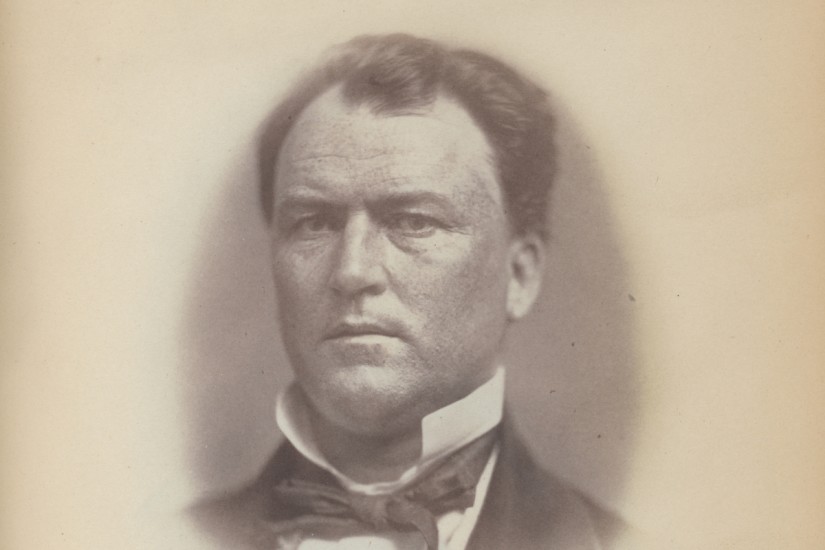On Monday, U.S. senators began publicly discussing the possibility of expelling Republican Roy Moore if he wins the December special election in Alabama. Moore, who has been accused of sexually harassing and assaulting underage girls, would be the first U.S. senator expelled from the chamber since 1862, during the Civil War.
That ignominious honor befell Democrat Jesse Bright of Indiana, who was ejected on Feb. 5, 1862, for disloyalty to the Union. He was the final of 15 members booted from the chamber in a sort of Senate housecleaning that followed secession and the onset of civil war. Newly elected anti-slavery Republicans furious at proslavery Democrats and Confederate sympathizers sought to punish all who did not resign voluntarily. Bright was the only Northerner included in the cleansing.
The comparison is imperfect. But the extreme circumstances of Bright’s ouster should indicate to Americans today how odious the current Senate finds Moore. So odious, in fact, that should Moore be expelled, it will be with the approval of his own party. Such a move hasn’t been successfully attempted in 155 years. That Republicans are now considering it suggests that the GOP in 2017 is facing a potentially fatal crisis, one not unlike Democrats in 1862.
Throughout the 1850s, Jesse Bright had been one of the most powerful leaders of the Northern wing of the Democratic Party, behind only President James Buchanan of Pennsylvania and Sen. Stephen Douglas of Illinois in his political clout. He was also one of the most despised men in the free states. Though he was elected by the Indiana state legislature, Bright was a Kentucky enslaver who, when not in Washington, spent his time on his plantation lording over his slaves and complaining to correspondents that he had “no other amusements than those afforded by an interchange of civilities with N——s and Dogs.”
Bright’s reputation was built on his proslavery politics and dastardly partisan tactics. Despite lacking any formal education, he rose in Democratic ranks through utter ruthlessness and sheer determination. He had built a formidable Democratic organization in Indiana dedicated to the spread of slavery and the destruction of abolitionism. By the time he orchestrated his election to the U.S. Senate in 1845, Bright was considered by friend and foe alike the “autocrat” of Hoosier Democrats.
Bright was far more interested in power than fame, which is why few Americans know his name. Unlike the Senate “giants” of the antebellum era (like Daniel Webster, John Calhoun and Stephen Douglas), he preferred to work behind the scenes, content to pull the wires rather than bask in the spotlight. His proslavery politics, his iron will and his aversion to attention quickly won him the affection of Southern senators, eager for a dutiful Northern accomplice who could provide precious votes on proslavery legislation.
Indeed, it was Bright’s ability to hold Indiana in the Democratic column despite the rising anti-slavery tide that made him so powerful within the party. He was a reliable vote on countless measures that promoted slavery and sectionalism: supporting the Mexican War to add more slave states, the various proslavery components of the “Compromise of 1850” (including the abhorrent Fugitive Slave Law) and votes for bills spreading slavery into the western territories, such as the Kansas-Nebraska Act of 1854 and the Lecompton Constitution of 1858.
But such actions made him anathema among Northerners. By the late 1850s, Bright’s Democratic machine had become so wildly unpopular at home that he was forced to resort to tactics of dubious legality to stay in power. His reelection to the Senate in February 1857 was, by all accounts, fraudulent. He had arranged his own election through an unlawful meeting of the state legislature (which selected senators before the ratification of the 17th Amendment in 1913) and against the will of the majority of Indiana voters. When Bright assumed his seat, the U.S. Senate launched an investigation that, thanks to his powerful Southern friends, was dragged out and quashed.
Yet it was not fraud, corruption or partisan divisiveness that triggered his expulsion. Rather, it was perceived disloyalty. In 1861, Bright wrote a letter to introduce his friend Jefferson Davis, now the leader of the Southern rebellion, to a Texas arms manufacturer, and he recognized Davis as the legitimate president of an independent Confederate States of America. When Bright’s letter was revealed, senators jumped at the opportunity to expel their unsavory colleague. The expulsion of the Hoosier autocrat would be the final act for an angry Senate that had just expelled 14 Southerners for their support for secession.
On the day of his ejection, the barrel-chested Bright delivered an impassioned two-hour oration in his defense. “He seemed to take the matter pretty hard,” wrote one observer. Nevertheless, his Northern colleagues were unmoved and, with Republican Vice President Hannibal Hamlin presiding, the vote was taken. The chamber erupted in applause. “The expulsion of the traitor,” noted the New York Times, “while no more than an act of duty it owed itself, cannot fail to have an elevating and inspiring effect both on Congress and the country.”
Thus, Jesse Bright, who just months earlier had been an unstoppable force in American politics, found himself powerless. The Civil War had destroyed his beloved Democratic Party and ultimately made possible the destruction of slavery itself.
It is no wonder the U.S. Senate, though never short of unsavory characters and the criminally inclined, has not expelled a member since Bright (though the threat of expulsion has forced a few senators to resign). Only Bright’s special blend of infamy and willingness to fight until the bitter end provokes the shameful badge of expulsion. The Hoosier Democrat’s infamy lingers on, and woe to Roy Moore if the Senate deems him worthy of the same treatment.
